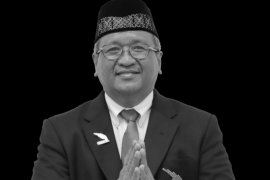A recent study has revealed some insights into how Islamic fanatics come to express regret for their extremism. Research conducted by a lecturer named Suratno from the University of Paramadina in Jakarta maps out the various situations that can lead someone to become an Islamic extremist and what can cause the extremist to then repent and change behavior. “Results from this research can advise the relevant authorities in carrying out de-radicalization programs,†he said as quoted by kompas.com in Jakarta on Monday.
In his research, Suratno said he carried out in-depth interviews with ex-Islamic extremists in Indonesia. They included Nasir Abas Ali Imron from regional terrorist group Jamaah Islamiyah (JI), Mataharitimoer from the Indonesian Islamic State (NII) movement and Jafar Thalib from the disbanded Laskar Jihad Muslim paramilitary group. The lecturer said he interviewed 10 ex-Islamist extremists for his research.
Suratno said it turned out that many people who joined with extremist movements were in fact “unstable†to begin with. Citing a term used by Arnold van Gennep (1960) and Victor Turner (1969), the lecturer said the unstable condition of the extremists was “liminalâ€.
He further explained that Gennep and Turner conceptualized liminality as a condition quite similar to the growing-up process of a human being, which saw many complex and ambiguous moments marking the transition from childhood to adulthood. “The liminal phase can make an extremist become a more extreme person or to repent and change behavior,†the researcher said.
For his doctoral dissertation in Frankfurt, Germany, Suratno researched the reasons why extremists decided to leave their radical ways and stop killing and abusing other people. This “anthropology of repentance†can be defined as a process that can lead to an exclamation of regret. The research reveals that the process, which triggers someone to join with an extremist movement, could also be influential in his or her decision to repent and change.
“If someone decides to join with an extremist group under the influence of his or her friends, there is a wider possibility that in the liminal process, he or she will repent and change,†said Suratno.
In general, he said there were push and pull factors that could lead an extremist to repent and change. Among the push factors included disagreements over the attitude of their leaders, their discomfort at witnessing and participating in torture and violence and changes in ideology.
Citing an example, Suratno said Abas decided to repent and change due to a disagreement with his leader, Abu Bakar Ba’asyir. Meanwhile, Mataharitimoer decided to leave his radical group due to leadership changes. Meanwhile, Jafar of the Laskar Jihad militia swore to God to change his ways after he learned of several ulema edicts.
Several other extremists said they wanted to leave their extremist groups for personal reasons. For example, some wanted to have a normal life and they missed their families. “Psychological changes and the power of love are often dominant in influencing an extremist to repent and change,†said Suratno.
From his research, Suratno said it was probable that de-radicalization programs could be successfully conducted. “Abas had the potential to repent and change due to his disappointment in Ba’asyir.
However, his heart was touched more deeply after he was interrogated by Col. Bekto Prasetyo, a gentle Catholic,†said Suratno, adding that careful psychological approaches were crucial to de-radicalization programs (http://www.thejakartapost.com/news/2016/02/15/how-do-islamic-extremists-become-aware-their-errors.html)
The Source of Problem and The Way To Solve It
In a separate place and time, the director of the Jakarta-based Institute for Policy Analysis of Conflict (IPAC), Sidney Jones, said it was wrong to think that during the New Order era from 1966 to 1998 Indonesia never had any hard-liners and radical groups because in fact these groups existed clandestinely underground. “Political repression under then president Soeharto’s administration was a major factor that created some of the extremist groups that Indonesia is dealing with today a terrorism,†Sidney Jones asserted.
“Take a look at Jemaah Islamiyah [a domestic terror cell]. They were born in 1993 and emerged to fight Soeharto, gathering forces against his ‘Asas Tunggal’ policy and to take revenge for the Tanjung Priok massacre,†Jones said, referring to the policy that criminalized those who subscribed to any ideology other than Pancasila and to the massacre of Muslims in Tanjung Priok, North Jakarta, by the Indonesian Military in 1984.
In preventing radicalization brought by the threats of extremist groups, ranging from the Islamic State of Indonesia (NII), Jemaah Islamiyah, to the cross-border Islamic State (IS) movement, she said that strengthening democratization might be the way. According to her, if people looked at the perspective that a government’s repression would lead to radicalization, then democratization could lead to a solution to end it. However, there were also problems created by democracy itself, which in some cases actually made the work to prevent radicalization harder.
Meanwhile, Islamic expert and editor at the Deutschlandfunk German public broadcasting radio station Thorsten Gerald Schneiders concurred, saying that while strengthening democracy might be good for newborn democratic countries, taking democracy to the next level might not work in several countries, including in Germany.
According to Thorsten, one of the challenges in European countries right now was the xenophobia that some Germans also had, especially those of right-wing parties, toward refugees from the Middle East, who were all considered to be members of extremist groups migrating to Europe.
It is an interesting research but the outcome from the one isn’t surprise me. Basically, extremism and terrorism are the soul illness. If terror group member and an extremist follower are realized that their action will be done before, it has confrontated with the value of religiousity especially Moslem, automatically extremist and terrorist will be become leaving their group if they have any chances.
Besides that, don't forget the government apparatus including police, state intelligence agency, BNPT etc were made a simultaneous action to minimilize terror attack and the growing extremism due to deradicalization process, disenggagement process etc. Last but not least, extremism and terrorism don't reflect Moslem values.
Some of experties, academia and an intelligence observer were forgot that terrorism and extremism could be become a part of proxy war to weaken a state or a religion which is attacked to make a grand scenario or public opinion that a state or a religion could be blamed on terror attacks and the spread of extremism. It would be interested if any researcher or academia was found an answer or a results from why is some state or some group make proxy war to another ones?
*) The writer is a terrorism and minority groups observer. Residing in Semarang, Central Java.
Extremism And Terrorism Should Not Be Followed
Rabu, 24 Februari 2016 23:13 WIB

Ilustrasi - Personil Polisi Satwa Berkuda saat mengikuti apel gelar pasukan pengamanan. (Foto Antara/Widodo S. Jusuf/Dok).
Last but not least, extremism and terrorism don't reflect Moslem values.









